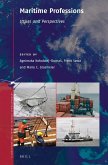Anthropology has an important role in articulating people's engagements with water at different spatial and temporal scales, and in showing how local relationships with waterways and marine areas translate into larger anthropogenic impacts on regional and global ecosystems. This volume explores diverse relationships with waterbodies, and considers how these are expressed in art, material culture and infrastructures. Focusing on the multiple and overlapping scales at which people relate to water in contexts including wave science, Indigenous cosmology, extractive industries and environmental activism, it suggests that efforts to achieve more sustainable and equitable engagements with water must also be multi-scalar.
Bitte wählen Sie Ihr Anliegen aus.
Rechnungen
Retourenschein anfordern
Bestellstatus
Storno








